 
|
||||
|
|
PAUL CHRISTIAN |
|||
|
mwe3.com presents an interview with
Paul Christian: I have lived my entire life in the Chicago area. I was born in the western suburb of Berwyn; my family lived in Brookfield at the time. Most of my school years were spent in Arlington Heights where I learned the guitar and “discovered” rock and roll. After college, I started my own family in the far Northwest city of Crystal Lake. About seven years ago, we moved to downtown Chicago and have lived there ever since. I love the city! It has a constant pulse you don’t get in the suburbs. The diversity is amazing… of thought, backgrounds, art, people… we can walk anywhere and do anything we want! My favorite travel destinations are at opposite ends of the spectrum. I love travelling to northern Wisconsin and the Upper Peninsula to get away from it all. I’ve written a lot of songs in the solitude of the Northwoods. It’s an amazing place to just sit back, look and listen. I also love travelling to the beaches of Mexico. The food, the culture and the people are amazing. We have not been to Mexico in quite a while unfortunately. mwe3: How long did it take you to write and record That’s Everything? Do you write the lyrics first or do you write the melody and chords first? Do you have a set idea for an arrangement for a song? How do songs come to you? Paul Christian: I worked on That’s Everything off and on for about 18 months. I really started getting serious about it in the winter of 2019. How songs come to me is a difficult question to answer. It’s a rather mysterious thing that is hard to describe…and hard to control too. First, I write everything on an acoustic guitar, and for starters, I keep a collection of guitar riffs and chord progressions that I capture on a handheld recorder. Usually, I explore different vocal melodies using nonsense words or just mumbling to accompany the musical idea. I also keep a collection of words and phrases I encounter that I find interesting. I try to practice “free-writing” almost daily on random topics. I will read through the writing later to pick out anything that is of particular interest, or to see if any underlying related ideas jump out at me. If I have a musical idea I like, I’ll develop a verse progression, chorus progression and rough vocal melody. Then I’ll start writing the lyrics drawing from my idea collection. Often, I am not really sure what the song is about until either I have one verse or a solid chorus. Once the purpose of the song is clear, multiple verses usually follow quickly. When they don’t, it’s usually because it’s not a good song! When I finish the initial song, I’ll have a basic arrangement in mind, but I don’t worry about that too much until I start recording a full demo with all the instruments and vocal harmonies.
Paul Christian: That’s Everything is a pretty broad title. We named the album after the opening track, but to me the meaning for the track and the album are slightly different. For the track, “That’s Everything” reflects my belief that we are all here for a reason. That reason may never be revealed to us. If you can believe that there is a positive reason we are here and be at peace with the fact you may never know why… that’s everything you need to know to lead a happy life. Easier said than done. For the album we struggled with the artwork. For every idea I threw out, Tom, at Salvatori Productions, produced dozens of images. None of them really hit the mark. My wife suggested using an image from our daughter’s wedding and she said something like “Isn’t that everything to you?” Tom loved it and suggested also putting a picture of my parents on the back to reflect on and in reference the two most personal songs on the album. So, in the context of the album…family, friends, love – that’s everything we need in life. mwe3: Your unique approach to songwriting can be heard on the title track. Is the song “That’s Everything” autobiographical and in what ways? Paul Christian: I suppose it is in a way. It is a song about a child struggling with how they fit into this chaotic and competitive society. The parent is trying to share some wisdom gained through their own struggle. The line “Thought I knew how every card was going to be played. Found out late, that God never makes a mistake” reflects a time in my life when life changed suddenly and my family’s whole future seemed in jeopardy. I was wrong, and things only improved after that. I came to believe there was a plan for me that I was at peace with not fully understanding. mwe3: “Just A Dream” is a great rock track and it’s also a good showcase for your electric guitar skills. How do the lyrics Delaware to New Orleans and San Francisco fit in? Paul Christian: This is story about a fictional runaway who leaves Illinois on a cross country trip. Delaware, to San Francisco, to New Orleans was a zig-zag path I thought seemed aimless and random. Kind of a fun song about a sad topic. mwe3: How did you record That’s Everything, being that there must have been a number of overdubs? What was the process like, in the recording studio and can you compare That’s Everything with writing and recording your first album American Dream? Paul Christian: I recorded everything digitally using an Apogee Element Pre-amp/Audio interface to a Mac. I used the Ableton Live DAW for all the multi-track recording. There are a ton of overdubs for sure! Recording and refining a song may be my favorite part of the whole process. I just sort of disappear into the song and hours will pass unnoticed. I start with the rough acoustic draft of a song and begin refining the arrangement and decide if/where a solo or bridge is needed. Once I have an arrangement, I start by recording the drums. After the drums, I record the basic rhythm guitar track. I spend a lot of time at this point making sure the rhythm guitar and drums are complementary by adjusting both parts as necessary. I’ll also record rough vocals at this point to make sure the cadence of the vocals, guitar and drums all blend well. From there, it’s all about discovering and composing all the other parts. I’ll write and play a bass part…messing around with numerous takes until I get something I like. I’ll experiment with electric guitar effects, piano, mandolin, banjo, slide guitar, whatever! If I find something I like, it becomes part of the song. Lots of ideas/instruments get rejected during the process. Vocals and harmony vocals are usually the last thing I record. Vocal harmonies are harder than I thought they would be. Singing along with a Beatles song is one thing; but trying to create harmonies like that out of nothing is really tricky for me.
Paul Christian: Honestly, the only instrument I can claim to be proficient in is the six-string guitar. Playing in bands over the years, there were times where I needed to play a little bass, or we needed a mandolin to play “Losing My Religion” or “Going To California” so I picked that up a bit too. I inherited the banjo from my Dad and I can really only just plunk around on it a little bit. I think it sounds good on the recordings, but I am sure serious banjo players are wondering “what is this?” I’ve played with friends and in some bands over the years, but the only serious band I’ve been a part of is the Dangerous Joes. We formed sometime around 2010 with myself on guitar and my long-time musical partner Joe Chatman on bass. We shared the vocal duties by alternating lead and harmony vocals. Prior to this, I really only sang alone in my room, so this was quite a stretch for me. We brought in a drummer and started as a three-piece band. Suddenly I found myself responsible for all the rhythm guitar, lead guitar, lead vocals and alternately harmony vocals. We learned hundreds of cover songs and were regularly playing three hour shows. We practiced like fiends because we did not want to embarrass ourselves on stage. Later we added a dedicated lead guitarist and were able to create far richer arrangements. This experience had a tremendous effect on my confidence, competence and understanding of how a good song is constructed. Playing with other people is critical to becoming a good musician. Recording these albums by myself is very fun and rewarding but playing with others is irreplaceable. Just recently in 2019, I did re-form the Dangerous Joes with a new drummer with the intention of playing American Dream live. We spent months learning the songs as well as dozens of covers. Unfortunately, we only played one summer festival gig in the summer of 2019 before the whole thing crumbled due to work responsibilities and injuries. After a short break, I started focusing on “That’s Everything”. I intended to have other musicians play on That’s Everything, but I wasn’t meant to be. Once the pandemic hit, that sealed its fate as another solo effort. mwe3: How about “Nobody’s Listening”? Is the lyric a political commentary or something more basic? Were any of these songs written during the pandemic of 2020? Paul Christian: “Nobody’s Listening” is another parent-child song. The parent is the narrator in “That’s Everything” and in response, the child is the narrator in “Nobody’s Listening”. The lyric “Your fated plan is just another lie, there’s nothing out there it’s just you and I” is an impertinent response to “Always believe and be at peace” message of “That’s Everything”. Many of the songs were completed/refined during the pandemic, but only “The Best Day of My Life” was written during the pandemic. I had the “best day” chorus in my riff bank, but I didn’t know what to do with it. Once I asked myself what the best day of my life actually was, the song took shape. mwe3: How did you team up with Julie Chatman for the “Memphis Tonight” track? Tom told me that she’s the only other musician to play on your album, which is quite amazing in itself. Tell us about working with Julie Chatman. It’s a highlight from the album. Are the lyrics based on someone or something? Paul Christian: Julie is the daughter of my long-time friend and musical partner Joe Chatman. She would occasionally join the Dangerous Joes on stage to sing a country song or two. She has a great country voice with an awesome raspy tone. I really love her work on this song. Julie was a little reluctant, but with Joe’s help we talked her into it. We recorded her part during the pandemic in her dad’s basement with the three of us in a large triangle. She was so prepared – she had the phrasing and melody down pat, exactly like the demo I provided her. I had her sing a bunch of takes, but honestly, she nailed it every time. I could have used any of the takes. The story of the song is a work of fiction. This is another example where I had the chorus, but I didn’t know what to do with it. I had a child apologizing to his mother in mind, but nothing further developed until I envisioned a young couple whose relationship never got a chance to develop. This song is a good example of how a song needs to reveal its purpose before I could finish the lyrics.
Paul Christian: Joanna is another fictional character meant to represent all of us. There are a lot of ideas swirling around here, but ultimately, it’s a song about the loss of innocence we all experience eventually. I originally recorded this song at a slower tempo and I was close to cutting it. But I really liked the psychedelic dual guitar solo concept. Once I sped it up, I realized it was a really solid song. Although, most of my songs are very folksy or even country, I have always loved prog-rock and the predecessors to psychedelic rock like Led Zeppelin’s “Dazed and Confused” live and the Beatles “Tomorrow Never Knows”. I tried to create some of that feel in several of the tracks. mwe3: Does “Waiting For My Turn” reflect your more roots-rock skills? It’s a country-rock kind of track. Did you play banjo on that track? Did you write it for someone specific? Seems like a kind of everyman kind of statement. Paul Christian: This is a simple, straight up key of G country-rock progression. I did play banjo on this track. I sort of plunked away with a lot of hammer-ons and pull-offs to mimic the sound of banjo picking. I think it turned out pretty solid and fits the song well… at least to my ear. You are definitely correct that it’s an everyman kind of song reflecting the drudgery of working a job when there are many other things you’d rather be doing with your life. I wrote it with myself and a woman I worked with in mind. In the end, the woman won out as the narrator – although her name is not actually Jesse! mwe3: “The Best Day of My Life” is something everyone experiences. Is it something you had to write about to kind of get it out of your system? My experiences are a lot like yours was. Losing parents is torture, at least that was my experience. Your guitar solo is very nimble and well-placed on that track. Interesting that you mention the two lovebirds singing for the sad humans. Paul Christian: This is a true story right down to the songbirds. I have a friend who told me whenever she sees a cardinal, she believes it’s her deceased father paying her a visit. I suppose my parent’s passing was something weighing on my mind because when I started to consider what the best day of my life was, the songbirds came to mind. It was late spring during the pandemic and I was out on my roof deck enjoying the warming temperatures. My oldest brother had also recently passed, so I was thinking about the three of them, and if I had done enough. A pair of cardinals sat in a nearby tree singing. They stayed a long time and I thought of my friend’s sentiment. As I imagined, they were my parents stopping by to say hello… and the seed for this song was planted. mwe3: Your press releases mentions They Might Be Giants as an influence on “Bicycle Messenger”. The song really rocks. Can you explain some of the lyrics? Is that one of your more rocked out tracks? Does the bicycle messenger have another meaning and does he also do the “skater chic” thing after hours? The guitar solo is very cool too. Paul Christian: It’s really just about bicycle messengers! I get a lot of song ideas from people watching. In the office building where I used to work, there was always a group of bicycle messengers outside gathered around the only ashtray… smoking and swapping stories. Bicycle messengers are all over the city of Chicago, riding like wild; weaving in between cars and taking incredible risks. I just started to imagine what their lives were like. The lyrics describe their bikes, their “skater chic” clothes, their tattoos and their dedication to a very unique lifestyle.
Paul Christian: I am glad you like this one. It’s also one of my favorites. No question I spent more time on this one song than any other track. It started out much shorter, but Tom said of the 3-minute demo “if you’re going to go in this direction, we need to take it all the way to epic!” So I went back to the drawing board and wrote another verse and made it even more expansive with a second, more searing guitar solo section. The concept of the song originally started out as part of a Trilogy – “The Oracle, “The Boy” and “The Captain” – but the other two parts stunk. I wrote this one on my acoustic guitar up in the Northwoods. I have always been fascinated by the idea of an “oracle” predicting/seeing the future. I also had this idea of an ill-prepared, post-apocalyptic escape from earth into space. Before the disaster that caused the exodus, an oracle foretold the coming of a boy who would save humanity. That is the basic nugget behind the story. mwe3: Would you say “The Boy” is kind of a psychedelic track? There’s some great guitar work on it. Is it fictional and can you describe your mindset behind the lyrics, which are kind of cryptic as well? Paul Christian: Yes, it’s my attempt at science fiction in a song! It started off folksier but the EmMaj7 opening chord carries with it a certain darkness. When I started recording it, I thought… what could I do with the walk-up progression between verses? I got the idea to slowly build up to “something” with wild strings and spacey noises. The something became the electric guitar part which also builds up further before releasing back into the dark EmMaj7. mwe3: Also, can you tell us what guitars and effects you’re playing on “The Boy”? Did you play the same guitars on all the album tracks or did you vary things up between acoustic guitars and other instruments? Tell us something about your guitars. How many guitars do you have in your instrument collection - electric and acoustic - and how many were used on the new album? Paul Christian: The guitar effects are pretty basic on The Boy. On the electric, it’s just a saturator, a tube screamer, some compression and some reverb. The ambience comes from a string section playing super rapid notes like a swarm of mechanical bees and a couple Ableton Live Flutter effects -low tone, underwater and high tone. All of that was run through a reverb effect called Ethereal Canyon. I have collected a lot of guitars/instruments over the years – some cheap, some expensive. Here’s a list: Acoustic: Electric: On the album I used the two Breedlove guitars, the PRS Mira, Taylor T5Z and the PRS hollow body. Each guitar has a different character, so I chose them based on the sound I was trying to achieve. I also used the Fender P-Bass on most tracks, the Rogue mandolin and the Ludwig Banjo on a few tracks. I also used the Yamaha classical on “Nobody’s Listening”.
Paul Christian: It’s a simple relationship song again in the classic Country music key of G. It never ceases to amaze me how many songs can be created from the basic major scale building blocks. This song was inspired by the opening track of Paul Westerberg’s 49:00 Of Your Life release. It’s an amazing piece of work that he had to pull commercially because he ended the album with a bunch of snippets of cover songs without obtaining the rights. Someone objected and he had to pull it. Find it if you can, its awesome! The opening track is about a guy who finds out his old flame is marrying someone else. I wrote “Speak Now” using the same theme. mwe3: “Worn Answers” follows “Speak Now” with a kind of similar country-rock vibe but it’s even more caustic! Someone you know? Is it romantic based or more about a family member or worse! Paul Christian: It’s not about anyone I know, but a scenario I made up. These were two people I saw in a park arguing and I could tell she was winning – in fact, she always wins. So I wrote a song about them. I had John Hiatt in mind when I wrote this song, but I am not sure that the song bears any resemblance to his work at all. mwe3: “Untamed” is easier to fathom. The guitar solo is great. Is it about someone you know? Is it about musicians and life on the road? Not all cutting edge musicians have Keith Richards’ money so as Marshall Crenshaw says, “you better watch out”. Paul Christian: This is actually a song about long-haul trucking. I originally called it “The Road”. The song is about another couple I observed in the wild. I was stopped at a red light, and a semi had just pulled up in a nearby service station. I saw a woman with red hair, a wizened face, and this crazy skull on her jacket step out of the cab. I was like, wow! – look at her! Seconds later, this downtrodden guy got out the passenger side in a member’s only jacket and followed her into the minimart. In all truthfulness, he didn’t trip and fall, but he was probably about to when my light turned green and I pulled away from the scene. mwe3: “My Little One” is pretty obvious. Tell us about that track and something about your family? Was it your response to being a Father? The track features your piano work - very tasty. Is it easier to write about real life, compared with 3rd person topics? Why did you close That’s Everything with this track? Did you choose the sequence of tracks? Paul Christian: This one came about prior to my daughter’s wedding. It was on my mind that I needed to write a speech for the wedding. A few of her friends had recently been married and their Dad’s had great speeches, so I was stressing a little bit. With that in the back of my mind, one day I found myself home alone, so I grabbed a guitar and started messing around with some riffs. This riff came to me and I suddenly thought I should write a song for my daughter. The lyrics came together pretty quickly for me, and I thought maybe I should sing this at her wedding. My wife gave the idea a green light. I kept the song and the plan secret until the big day. Since no one else had heard the song, I remember thinking the morning of the wedding – what if it stinks? Oh well – too late now! It went off really well. It was a total surprise for everyone and there was not a dry eye in the house as Keith Richards would say. Being a father is tough. I feel a lot of responsibility to provide for my family, wife, daughter and son, and I have a tendency to take it personally when they struggle with various problems. I think it’s harder to write about personal things because you have to dive deep into personal areas you may not want exposed. That’s where the best stuff comes from though. We thought of this album as something to listen to as a whole, which had a big influence on the sequencing. Tom has a real knack for picking the sequence of tracks. We felt “My Little One” was something to look forward to and would make a great final track. Tom is so old school; he thinks of the sequence in terms of album sides. Side A ends with “Best Day” and Side B with “My Little One”. Both personal, deep songs. mwe3: Also do you play drums on the album or is it programmed drums? What other forms of percussion do you play on the album? It’s remarkably tight sounding. Paul Christian: Full confession… the drums are 100% programmed. Ableton has a ton of different drum kits to choose from and a ton of customization options to adjust the tone. I painstakingly program them - hit by hit. What’s nice though is it’s easy to fix things that don’t fit once all the other parts are recorded. After “Speak Now” was completed, I realized the drums were really poorly done. I was able to quickly fix the problems and save the song. That would have been really difficult with live drums. We did consider recording live drums for this release, but Tom was able to bring out the best of my MIDI tracks while mixing and mastering. mwe3: Some say 2021 will start off slowly and that it will be much like 2020 for the next few months. Did you write and record any of the music on That’s Everything or other songs during the Pandemic? What will you reflect back on about 2020? The isolation, the fear of (still) getting the virus… it was also very hard on musicians and those that make their living working in theaters and clubs. Paul Christian: I only wrote “Best Day” during the pandemic but did a majority of work on “The Boy” recording and also added finishing touches on several of the other songs as well during 2020. I have started writing more material during the pandemic for our next release. I am very fortunate to have a job I can perform remotely and to work for a great company that supports its employees. 2020 has been mentally stressful, but thankfully we have not had the financial challenges many have suffered. Over the years I’ve met some full-time musicians that I haven’t been in touch with lately. I hope they have been able to weather the year without giving up on their dream. 2020 certainly put a halt on my live musical ambitions. After the breakdown of the Dangerous Joes I mentioned earlier, Joe and I decided to put together an acoustic duo to play American Dream, That’s Everything and a whole new set of covers. We picked a bunch of songs, started practicing them and I even bought a new PA system for small venues. But then the bottom fell out. Since March, we have hardly been able to get together; and because of the pandemic, there has been no chance of finding a place to play. I am certainly looking forward to the next normal.
Paul Christian: The Dangerous Joes were able to perform most of American Dream and a few songs from That’s Everything live at a summer festival in 2019. The songs were well received, and the band played them really well. I definitely want to keep performing these songs live. The future is a little uncertain, but when the time is right, I’ll form a new band to get these songs out there live. I am not a big fan of online concerts. It feels too remote and sterile. The biggest part of a live performance for me is the shared experience of a group of people all experiencing the same unique creation, the same emotions and the same energy, side-by-side and face-to-face…
|
|
|||
|
||||

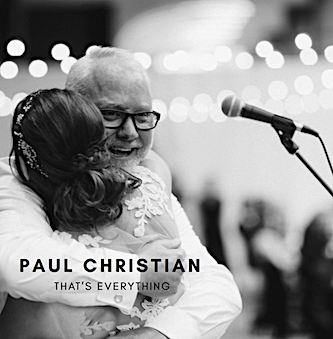 An established guitarist and composer known for his impeccable instrumental approach to neoclassical / avant-prog guitar music, Tom Salvatori is also the owner of his Salvatori Productions music label. Expanding on his label’s repertoire, Tom moves into the pop-rock market with the 2020 album release of That’s Everything, his second release by Chicago-based singer-songwriter Paul Christian. Back in the late 1960s, early ‘70s, the singer-songwriter sound was all the rage and in the spirit of country-rock legends like Buffalo Springfield and Poco, Paul Christian’s music defies genre. Mixing folk, rock and country to great effect, That’s Everything is a do-it-yourself album in the truest sense of the word. Speaking about Paul Christian, the album’s co-producer Tom Salvatori tells mwe3, “Besides being a great songwriter, Paul is a multi-instrumentalist… he performed on all instruments (guitars, bass, drums, keyboards) and as a result, we gave him co-producer credit as well. The only guest appearance on the album is Julie Chatman who performs the female vocal part on track 4 - "Memphis Tonight.” Through the wonders of modern-day studio music magic, Paul sounds like a one-man band and on several of the tracks, he even gets to show off his formidable electric lead guitar chops, case in point being track 9, “The Boy”. Most of these tracks have a deep in thought kind of singer-songwriter approach that ranges from influences such as early 1970s legacy artists Richie Furay and Harry Chapin to modern day vocalists like Marshall Crenshaw and Michael Stipe of R.E.M. Featuring memorable songs and first-rate musicianship, That’s Everything strikes a wonderful musical balance and in doing so creates an impressive collection of folk-meets-rock sounds.
An established guitarist and composer known for his impeccable instrumental approach to neoclassical / avant-prog guitar music, Tom Salvatori is also the owner of his Salvatori Productions music label. Expanding on his label’s repertoire, Tom moves into the pop-rock market with the 2020 album release of That’s Everything, his second release by Chicago-based singer-songwriter Paul Christian. Back in the late 1960s, early ‘70s, the singer-songwriter sound was all the rage and in the spirit of country-rock legends like Buffalo Springfield and Poco, Paul Christian’s music defies genre. Mixing folk, rock and country to great effect, That’s Everything is a do-it-yourself album in the truest sense of the word. Speaking about Paul Christian, the album’s co-producer Tom Salvatori tells mwe3, “Besides being a great songwriter, Paul is a multi-instrumentalist… he performed on all instruments (guitars, bass, drums, keyboards) and as a result, we gave him co-producer credit as well. The only guest appearance on the album is Julie Chatman who performs the female vocal part on track 4 - "Memphis Tonight.” Through the wonders of modern-day studio music magic, Paul sounds like a one-man band and on several of the tracks, he even gets to show off his formidable electric lead guitar chops, case in point being track 9, “The Boy”. Most of these tracks have a deep in thought kind of singer-songwriter approach that ranges from influences such as early 1970s legacy artists Richie Furay and Harry Chapin to modern day vocalists like Marshall Crenshaw and Michael Stipe of R.E.M. Featuring memorable songs and first-rate musicianship, That’s Everything strikes a wonderful musical balance and in doing so creates an impressive collection of folk-meets-rock sounds. 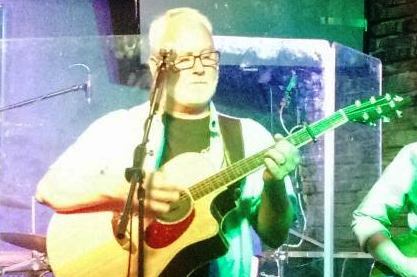 mwe3: Can you tell the readers where you’re originally from and where you live now and what do you like about it? I guess traveling is quite difficult these days but where did you like to travel before?
mwe3: Can you tell the readers where you’re originally from and where you live now and what do you like about it? I guess traveling is quite difficult these days but where did you like to travel before?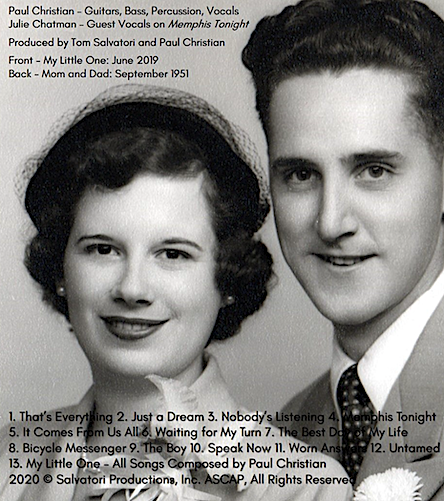 mwe3: Why did you call your new album That’s Everything? Is it because it contains so many different styles of music and so many different instruments too? How do you describe your music and approach to music making?
mwe3: Why did you call your new album That’s Everything? Is it because it contains so many different styles of music and so many different instruments too? How do you describe your music and approach to music making?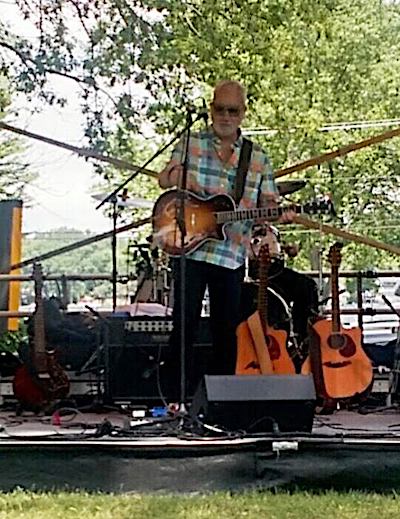 mwe3: It’s worth noting on “Just A Dream”, as on all the tracks, that you’re playing all the instruments, including drums too? How did you become proficient on so many instruments and handling vocals too? What is your history playing music with other people in bands, and can you compare playing with other instrumentalists compared to playing every instrument?
mwe3: It’s worth noting on “Just A Dream”, as on all the tracks, that you’re playing all the instruments, including drums too? How did you become proficient on so many instruments and handling vocals too? What is your history playing music with other people in bands, and can you compare playing with other instrumentalists compared to playing every instrument? 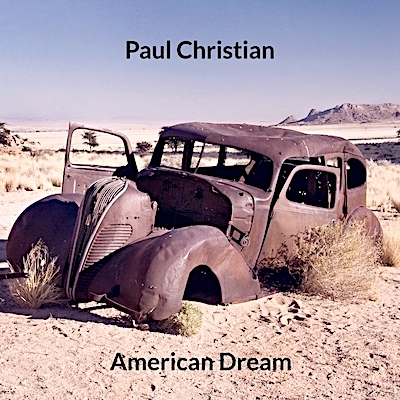 mwe3: How about “It Comes From Us All”? It has a kind of R.E.M. sound and there’s some psychedelic sounding guitars that reminds me of The Byrds or other West Coast bands. You’re writing about someone named Joanna, who is that?
mwe3: How about “It Comes From Us All”? It has a kind of R.E.M. sound and there’s some psychedelic sounding guitars that reminds me of The Byrds or other West Coast bands. You’re writing about someone named Joanna, who is that?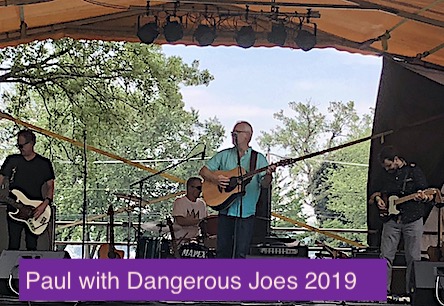 mwe3: Coming after “Bicycle Messenger”, the next track “The Boy” is one of your best tracks. The lyrics are very cryptic. Can you tell us something about the meanings in the lyrics?
mwe3: Coming after “Bicycle Messenger”, the next track “The Boy” is one of your best tracks. The lyrics are very cryptic. Can you tell us something about the meanings in the lyrics? 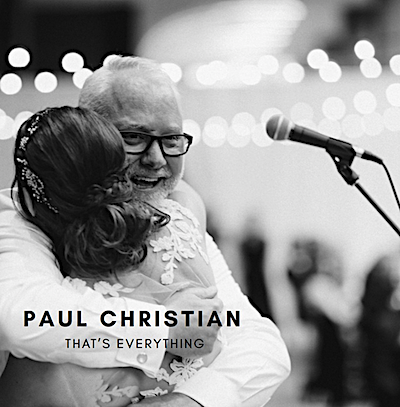 mwe3: “Speak Now” gets back to the country rock sound. That sounds familiar, is the song about relationships or something deeper, more significant, disillusionment perhaps?
mwe3: “Speak Now” gets back to the country rock sound. That sounds familiar, is the song about relationships or something deeper, more significant, disillusionment perhaps? 